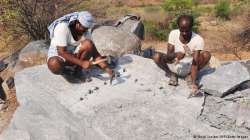India added 42 lakh modern-day slaves in two years, reveals study
Melbourne: India now has the dubious distinction of topping the global slavery index with 1.85 crore people of the nearly 4.6 crore people enslaved globally, a survey has found. The number is up from the

Melbourne: India now has the dubious distinction of topping the global slavery index with 1.85 crore people of the nearly 4.6 crore people enslaved globally, a survey has found. The number is up from the 1.43 crore recorded in 2014.
The factors taken into account for this study include forced labour, ranging from prostitution to begging. Modern slavery refers to situations of exploitation that a person cannot leave because of threats, violence, coercion and abuse of power or deception.
In terms of ranking, India comes fourth out of the 167 countries surveyed with the numbers seen in proportion of the country's population. The three nations ahead of India are North Korea, Uzbekistan and Combodia, while Qatar comes fifth in the list.
According to the 2016 Global Slavery Index released by Australia-based human rights group Walk Free Foundation today, these five countries combined accounted for almost 58 per cent of the world’s enslaved, or 2.66 crore people.
The Index presents a ranking of 167 countries based on the proportion of the population that is estimated to be in modern slavery.
The research included over 42,000 interviews conducted in 53 languages across 25 countries, including 15 state-level surveys in India. These representative surveys covered 44 per cent of the global population.
The countries with the lowest estimated prevalence of modern slavery by the proportion of their population are Luxembourg, Ireland, Norway, Denmark, Switzerland, Austria, Sweden and Belgium, the United States and Canada, and Australia and New Zealand.
The study also tracked the government actions and responses to the modern slavery and of the 161 assessed, 124 nations had criminalised human trafficking in line with the UN trafficking Protocol and 96 nations had developed national action plans to coordinate government response.
It noted that while India had more people enslaved than any other country, it had made significant progress in introducing measures to tackle the problem.
"It has criminalised trafficking, slavery, forced labour, child prostitution and forced marriage. The Indian government is currently tightening legislation against human trafficking, with tougher punishment for repeat offenders. It will offer victims protection and recovery support," it said.
It said that in addition to economic growth in India, ambitious programmes of legal and social reform are being undertaken right across the board, from regulation of labour relations to systems of social insurance for the most vulnerable.